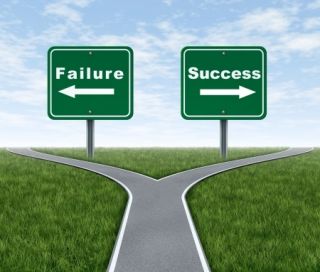Sometimes we succeed—we achieve our intended goals and ends; sometimes we fail and are left with the literal and psychic fallout. Most of the counsel about failure essentially says, “Failure can be a good thing,” “Look at the bright side of it,” or “Take it as a teaching about how to succeed in the future.” This kind of counsel may help us get back up after being knocked down; it can help us reduce self-criticism softening the blow and save us from too much shame and self hatred; and it can help us reframe our failures so that we can see them in a more positive light. More specifically, some writers and counselors suggest that we focus on the fact that even though we have failed, we have nonetheless survived. Others suggest that we focus on how failure can help build more character, courage, or humility. Perhaps most commonly, many suggest that failure can ultimately lead to a more sustainable success via a process of learning what doesn’t work. While this advice can be helpful, it tends to act more like a balm or salve to our wounds maintaining the idea that success is ultimately what we want and that how we deal with failure is what is most important. However, in my practice I have regularly discovered that failure can serve a deeper psychological function prompting more profound change. Specifically, I have found that failure can help right our ship, make our values more true, or bring us closer to our own authentic path.

Consider the following:
1. Failure as intelligent resistance to our intended goal: Consider the client who told me that while she knew she needed to begin an exercise regimen, she kept failing to do so. I asked her, “How come you don’t exercise?” She responded, “I just keep blowing it off.” Through further inquiry, I discovered that she felt a powerful sense of responsibility to certain people and to the proper accomplishment of certain tasks even though she was not fully committed to all of these. She needed to back out of some of these responsibilities but was having a hard time getting the courage and personal freedom to renegotiate her agreements and relationships. When I asked her why she didn’t make these changes, she said that she didn't want to “blow people off.” Effectively, instead of “blowing off” other tasks and people, she “blew off” her commitment to exercise. Her failure had a secret intelligence in it—she was resistant to being overly responsible and needed to develop, strengthen, and practice this resistance. If we could somehow get her to “succeed” at her exercise goal we might never discover that she needed to develop a lot more than physical strength via exercising her body, but psychological strength via exercising her resistance. It was the power of her resistance, which seemed to be her enemy, that would eventually help her make more radical changes in her relationships and work.
2. Failure as course correction: Failure can also result because the goals that we think we have are not our true or deepest goals. People say, “Visualize what you want,” “You can’t get there if you don’t know where you are going,” or “Set clear goals and intentions.” Here’s the psychological trouble with this advice—it assumes people are conscious of their deepest goals, desires, and intentions. However, if there is one thing that can clearly be learned from 100 years of modern western psychology, it’s this: We are mostly unconscious of our deepest needs, desires, and nature. What happens when we are not conscious of our deeper goals and desires? We often “fail” and we seem to be derailed. This is most evident with addictive patterns, including eating patterns, where the majority of people fail to meet their goals because what they are deeply hungry for is more important than getting clean or thin. For example, I remember a client who had a goal of creating a secure family but he kept engaging in very risky activities that regularly left him physically hurt. (i.e., racing cars and snowmobiles). He came to me wanting help to stop these activities so that he could be there for his family. The problem was that he loved living life at the edge; he needed a way to live more at the edge on a regular basis or he would fail at building more security. His deeper goals derailed his less conscious goals.
I have seen other people who believe they should make more friends, read more, make more time with family, be more politic at work, gain enough money to get a fancier car or home, and guess what—if their deeper goals weren’t in accord with these goals, they failed to achieve them. In short, failure can be meaningful, turning us away from goals that are less aligned with our deeper selves.
3. Failure as a shift in our vision of success: Failure can also result because our very definition of success needs to change, deepen, or conform less to traditional and conventional notions. Consider the fact that most ideas and images of success are expressed in terms of attainment, increase, growth, or upward movement. We are all used to ads and exercises that lead us to focus on obtaining the good life—nicer house, more money, better relationships, or even more peace. These ideas suggest that success is getting ‘more’ of something. However, life doesn’t always move us upward or in the direction of increase; in fact, often our direction or path in life involves dropping down or out, letting go, softening, and nourishing parts of ourselves that don’t lead to some kind of linear accumulative development. This was uniquely expressed in a dream I had. In the dream I was building a business and had an interview with the CEO of American Express who was going to be my new client. I was excited as I went up the elevator to the top floor’s penthouse office. After the meeting, I went down the elevator to the ground floor where two ‘regular people’ were break-dancing, pointing to the floor, saying, “The vault is down below.” While I was wrapped up with going up, landing the big client, getting on the “American Express train” straight to success, another part of me was saying to look downward, dance with ‘regular’ folks (not the ones that could help my business), and stay closer to the earth than the sky. The dream challenged my definition of success and helped me deepen my values and appreciate things that could not be measured or added up. I have often found this often to be true—that people fail to become “successful” when their notion of “success” is narrower or even more superficial than their dreams or soul long for.
Personal Note: I know many espouse the belief that we need to get over our fear of failure or set our sails so firmly on success that nothing can stop us. While these ideas can certainly serve us at times and I have had many successes in my life, it has been my failures that have brought me closer to the earth where I first found love. It has been failure that helped me to first hear my own voice, which came in response to feeling my shared humanity with others. It has been failure that awakened my heart revealing the steps I needed to take in order to follow my own path.
********************************
You might also like:
Restoring Soul: Putting Psyche Back in Psychology
7 Essential Truths about Weight Loss Efforts: Parts 1-3
Let’s Keep in Touch!

Let’s Keep in Touch!
To find out about recent interviews, articles, and events, click here.
Schedule a one-on-one counseling session: dbedrickspeak@mac.com
Follow me on Twitter.
Find me on Facebook.
To read more of my posts on this blog, click here.
I am the author of Talking Back to Dr. Phil: Alternatives to Mainstream Psychology. Signed copies of the book are for sale on my website: www.talkingbacktodrphil.com.
Author Photo by Lisa Blair Photography.


